Foreign News
West African leaders make plan for military intervention in Niger
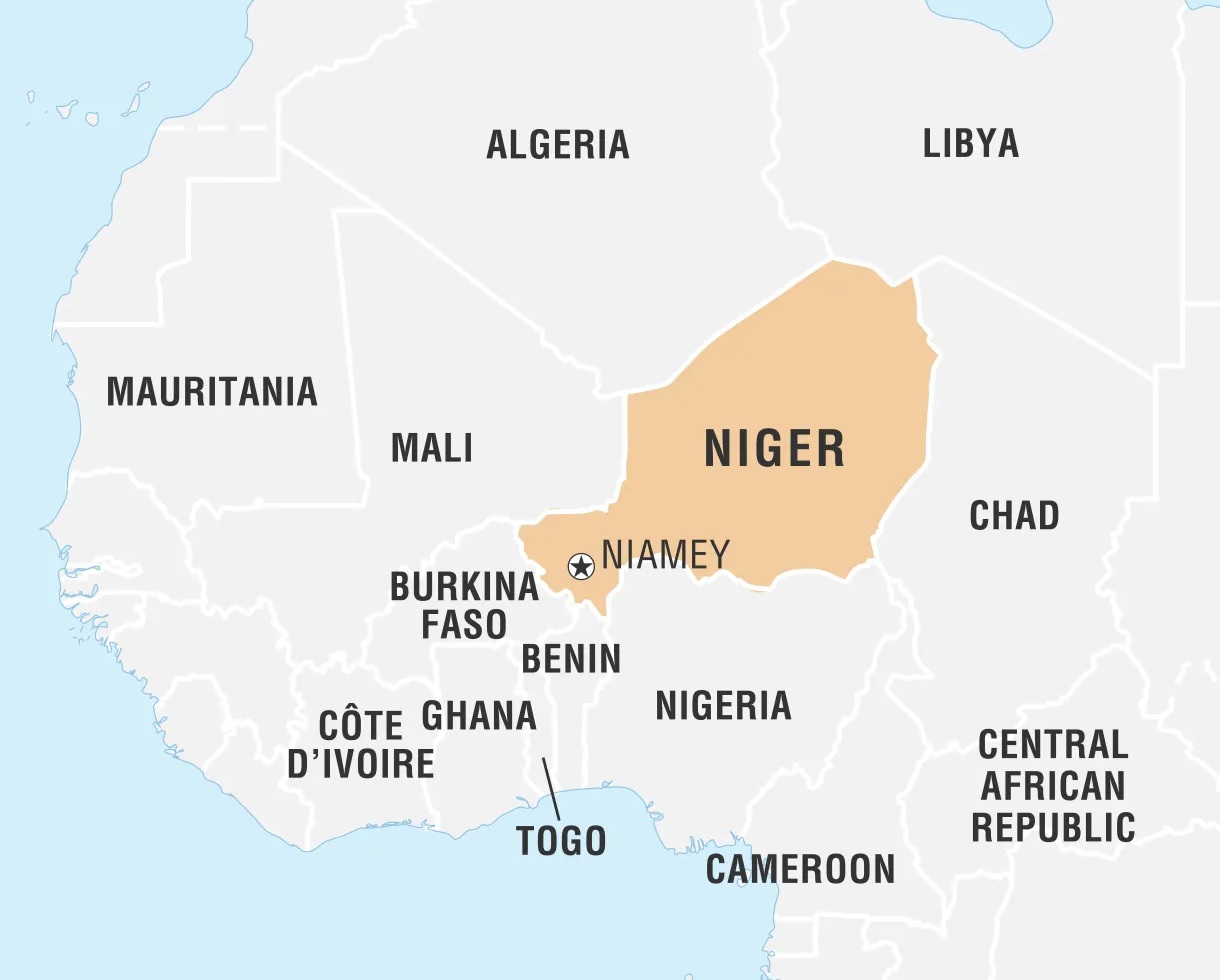
West African defence chiefs have made a plan for potential military intervention to reverse last week’s coup in Niger, including how and when to deploy forces.
The Economic Community of West African States (ECOWAS) will not divulge to the coup plotters when and where it will strike, but Abdel-Fatau Musah –ECOWAS commissioner for political affairs, peace and security – said on Friday the decision will be taken by the bloc’s heads of state.
“All the elements that will go into any eventual intervention have been worked out here, including the resources needed, the how and when we are going to deploy the force,” Musah said at the close of a three-day meeting in Nigeria’s capital, Abuja.
ECOWAS has already imposed sanctions on Niger and said it could authorise the use of force if the coup leaders do not restore power to elected President Mohamed Bazoum by Sunday.
The 15-member body sent a delegation to Niger on Thursday seeking an “amicable resolution”, but a source in the entourage said a meeting at the airport with the military’s representatives yielded no breakthrough.
“We want diplomacy to work, and we want this message clearly transmitted to them that we are giving them every opportunity to reverse what they have done,” Musah said.
Nigerian President Bola Tinubu told his government to prepare for options, including the deployment of military personnel, in a letter read out to the Senate on Friday. Senegal has also said it would send troops.
Niger’s military rulers denounced outside interference and said they would fight back. The 59-year-old coup leader, Abdourahamane Tchiani, served as battalion commander for ECOWAS forces during conflicts in Ivory Coast in 2003, so he knows what such missions involve.
Support for him from other military leaders in neighboring Mali and Burkina Faso, which are both ECOWAS members, could also undermine the regional response. The two countries have said they would come to Niger’s defence.
The coup leaders closed the borders of Niger on July 26 when announcing they had removed Bazoum from power. The borders were opened five days later.
Niger, which borders seven African countries – including Libya, Chad and Nigeria – is seen by the United States and former colonial ruler France as an important partner to address security threats in the region. The country is the largest recipient of US military assistance in West Africa, having received an estimated $500m since 2012.
The country also hosts more than 2,000 Western troops, mostly from the US and France. Various Western nations have cancelled aid and cooperation agreements with the military administration since the putsch.
Niger’s coup was the seventh military takeover in less than three years in Western and Central Africa.
Given its uranium and oil riches and pivotal role in the war with rebels in the Sahel region, Niger also has strategic significance for China, Europe and Russia.
(Aljazeera)
Features
How hoax bomb threats are hurting air travel in India
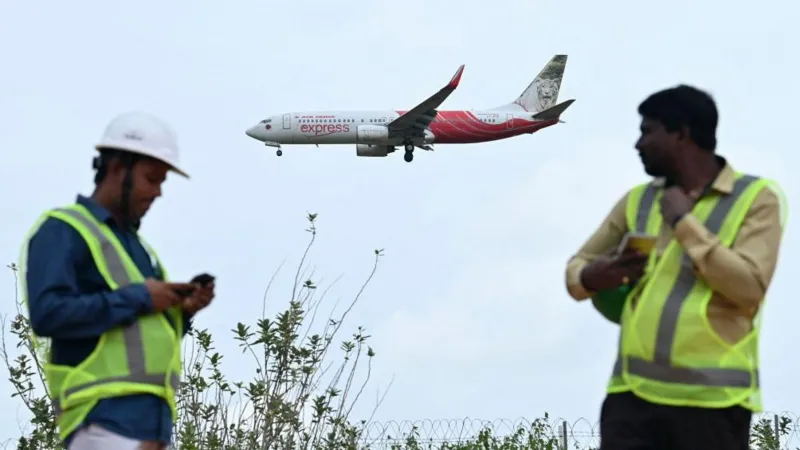
A dramatic and unprecedented surge in hoax bomb threats targeting Indian airlines is wreaking havoc on flight schedules, diverting planes and causing widespread disruptions.
A video posted on social media last week showed passengers draped in woollens, walking down the icy ladder of an Air India plane into the frigid air of Iqaluit, a remote city in Canada.
The 211 passengers on the Boeing 777, originally en route from Mumbai to Chicago, had been diverted early on 15 October due to a bomb threat.
“We have been stuck at the airport since 5am with 200 passengers… We have no idea what’s happening or what we are supposed to do next… We are completely stranded,” Harit Sachdeva, a passenger, posted on social media. He praised the “kind airport staff” and alleged Air India was not doing enough to inform the passengers.
Mr Sachdeva’s post captured the frustration and anxiety of passengers diverted to an unknown, remote destination. Hours later, a Canadian Air Force plane ended their ordeal by ferrying the stranded passengers to Chicago. Air India confirmed that the flight had been diverted to Iqaluit due to a “security threat posted online”.
The threat was false, mirroring scores of similar hoaxes targeting India’s airlines so far this year. Last week alone there were at least 30 threats, resulting in diversions, cancellations and delays. In June, 41 airports received hoax bomb threats via email in a single day, prompting heightened security.
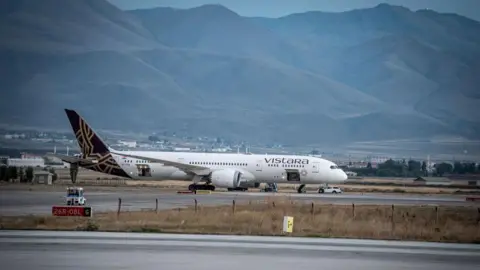 A Frankfurt-bound Vistara plane was diverted to Turkey after a bomb threat in September (BBC)
A Frankfurt-bound Vistara plane was diverted to Turkey after a bomb threat in September (BBC)For context, between 2014 and 2017, authorities recorded 120 bomb hoax alerts at airports, with nearly half directed at Delhi and Mumbai, the country’s largest airports. This underscores the recurring nature of such threats in recent years, but this year’s surge has been sensational.
“I am deeply concerned over the recent disruptive acts targeting Indian airlines, affecting domestic and international operations. Such mischievous and unlawful actions are a matter of grave concern. I condemn attempts to compromise safety, security and operational integrity of our aviation sector,” federal aviation minister, Kinjarapu Ram Mohan Naidu, said.
So what is going on?
Hoax bomb threats targeting airlines are often linked to malicious intent, attention-seeking, mental health issues, disruption of business operations or a prank, experts say. In 2018, a rash of jokes about bombs by airplane passengers in Indonesia led to flight disruptions. Even fliers have proved to be culprits: last year, a frustrated passenger tried to delay a Spicejet flight by calling in a bomb hoax alert after missing his check-in at an airport in India’s Bihar.
These hoaxes end up wreaking havoc in one of the world’s fastest-growing aviation markets. More than 150 million passengers flew domestically in India last year, according to the civil aviation ministry. More than 3,000 flights arrive and depart every day in the country from more than 150 operational airports, including 33 international airports.
Last week’s hoaxes peaked even as India’s airlines carried a record 484,263 passengers on a single day, 14 October. India has just under 700 commercial passenger planes in service, and an order backlog of more than 1,700 planes, according to Rob Morris of Cirium, a consultancy. “All this would certainly render India the fastest growing commercial aircraft market today,” says Mr Morris.
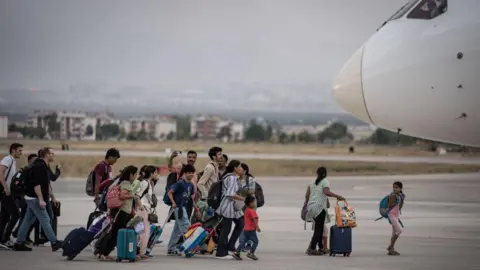
Consider the consequences of a bomb threat alert on an airline.
If the plane is in the air, it must divert to the nearest airport – like the Air India flight that diverted last week to Canada or a Frankfurt-bound Vistara flight from Mumbai that diverted to Turkey, in September. Some involve fighter jets to be scrambled to escort planes reporting threats like it happened with a Heathrow bound Air India flight over Norfolk and a Singapore bound Air India Express last week.
Once on the ground, passengers disembark, and all baggage and cargo and catering undergo thorough searches. This process can take several hours, and often the same crew cannot continue flying due to duty hour limitations. As a result, a replacement crew must be arranged, further prolonging the delay.
“All of this has significant cost and network implications. Every diverted or delayed flight incurs substantial expenses, as grounded aircraft become money-losing assets. Delays lead to cancellations, and schedules are thrown off balance.” says Sidharath Kapur, an independent aviation expert.
The dramatic rise in bomb threats on social media from anonymous accounts has complicated efforts to identify perpetrators, especially when emails are sent directly to airlines. The motives remain unclear, as does whether the threats come from a single individual, a group, or are simply copycat acts.
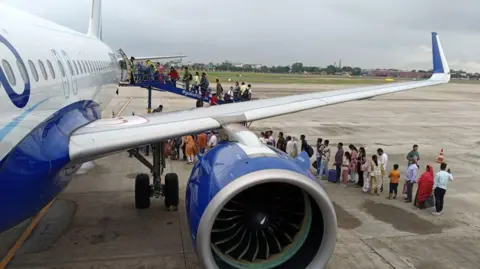
Last week, Indian authorities arrested a 17-year-old school dropout for creating a social media account to issue such threats. His motivations remain unclear, but he is believed to have targeted four flights – three international – resulting in two delays, one diversion and one cancellation. Investigators suspect that some posts may have originated from London and Germany after tracing IP addresses.
Clearly, tracking down hoaxers presents a significant challenge. While Indian law mandates life imprisonment for threats to airport safety or service disruption, this punishment is too severe for hoax calls and would likely not withstand legal scrutiny. Reports suggest the government is considering placing offenders on a no-fly list and introducing new laws that could impose a five-year prison term.
Ultimately, such hoax threats can cause serious anxiety for passengers. “My aunt called to ask if she should take her booked flight given these threats. ‘Should I take a train?’ she asked. I told her, ‘Please continue to fly’,” says an aviation consultant, who preferred to remain unnamed. The threats continue to disrupt lives and sow fear.
(BBC)
Foreign News
King Charles begins Australia tour with church service
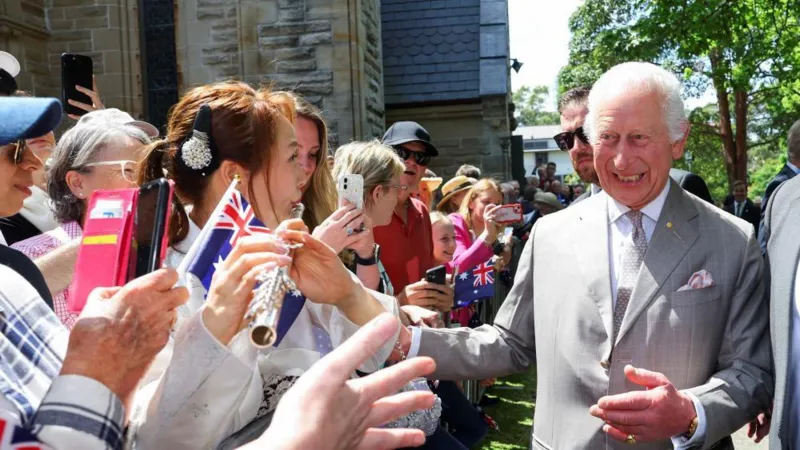
King Charles and Queen Camilla joined a church congregation in Sydney for a Sunday service on the first day of engagements during their tour of Australia.
It is the King’s first visit to Australia since he became the country’s head of state in September 2022 and is the biggest trip the King has made since starting cancer treatment in February.
Their six-day visit to the Commonwealth country will involve meeting political and community leaders, and also celebrating the nation’s people, culture, and heritage.
They were joined by members of St Thomas’ Anglican Church in northern Sydney for the service, which was officiated by the city’s archbishop, the Most Reverend Kanishka Raffel.
The royal couple met some well-wishers after a crowd of a couple of hundred people – many who had queued since early morning – were allowed into the church precinct to speak to the royal couple after the service.
For most it was a snatched hello and a chance to hand over flowers or take a photo.
Lyn Tarbuck attended with her husband Bob, a republican, and her two King Charles spaniels. She said of the monarchy: “I think it’s joined forces – if we have a problem in Australia they will help us out. We are a very big country but small in population so the more help we get the better.”
Roslyn Durie, who saw the Queen on her 1980 visit to Australia, said she was “so emotional” after receiving “a good firm handshake” from the King.
Sandra Hall and her husband Peter were also there to greet the royal couple. Ms Hall said: “I shook hands with Camilla first and welcomed her to Sydney, then Charles came along. I said ‘look, it’s a beautiful sunny day’ – and he said ‘it’s always sunny in Sydney’.”
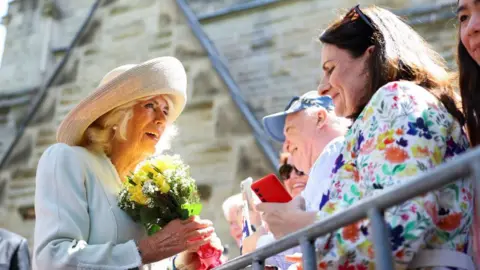
Outside the church, a small but noisy group of about 20 protesters shouted “not our King”.
They held banners, one reading “decolonise”, and waved Aboriginal and Palestinian flags.
Wayne Wharton, an Indigenous Kooma protester from Brisbane, called out: “I charge you, I charge the King … with crimes against the sovereign nations of this country … of war crimes against our people.”
“I do not recognise the illegal occupation of this country,” he said.
He had started with a megaphone but was told by police to put it down or face receiving a fine.
Also on Sunday, the King presented the New South Wales state parliament with an hourglass to celebrate the 200th anniversary of its upper house.
He also gave a speech to guests, in which he spoke of his “great joy” of visiting Australia for the first time as Sovereign, “and to renew a love of this country and its people which I have cherished for so long”.
On Saturday, a rest day for the couple, an image was released of the King and Queen Camilla showing the royals after their arrival on Friday at Admiralty House, the official residence of Australia’s governor-general, who represents the King in the country.
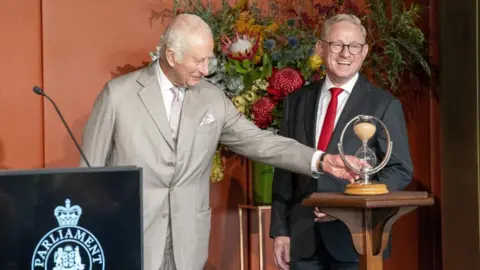
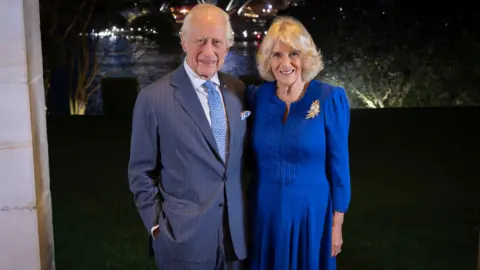
The couple were said to be touched when Sydney Opera House, which can be viewed from Admiralty House, was lit up with a rolling projection of images of them.
The King’s trip has been marked by his appointment to the honorary ranks of Admiral of the Fleet, Field Marshal, and Marshal in the three services of the Australian Defence Force.
Elsewhere, the Association of Commonwealth Universities, of which the King is a patron, has announced the launch of the King’s Commonwealth Fellowship programme.
It has been developed in response to urgent economic, social, and environmental challenges affecting small island developing states.
“There is so much we can learn from one another as we work together within the Commonwealth to tackle the major challenges of our age and, as these fellowships do in small island developing states, to address them where they are felt most acutely,” the King has said.
While in the Commonwealth country, the King’s visit will include supporting environmental projects and a naval review in Sydney Harbour.
The 75-year-old monarch is also expected to meet two Australian scientists, Georgina Long and Richard Scolyer, who have carried out pioneering research on melanoma – one of the country’s most common cancers.
There will be a reception in the capital on Monday to welcome King Charles, but the six state premiers – of New South Wales, Victoria, Queensland, Western Australia, South Australia, and Tasmania – have said they are unable to attend.
A post on the Royal Family’s X account said the trip would include the King addressing the Australian parliament in the capital Canberra.
The King’s cancer treatment has been suspended while in Australia and during the trip’s next leg in Samoa, where he will attend a Commonwealth leaders’ summit.
The timetables for the royal tour do not include evening engagements, state dinners, or trips out late in the day.
A message on the the Royal Family’s social media account said: “Ahead of our first visit to Australia as King and Queen, we are really looking forward to returning to this beautiful country to celebrate the extraordinarily rich cultures and communities that make it so special.”
[BBC]
Foreign News
‘Merchants of death’ trial steps up fight against Channel smugglers
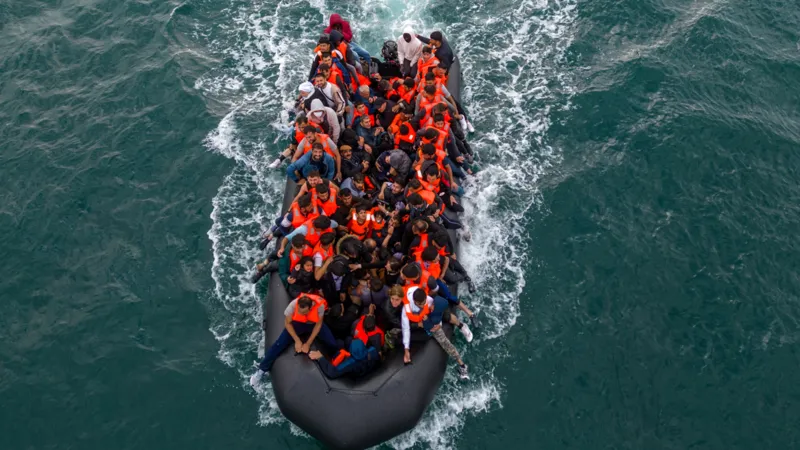
Peering over her glasses, the French judge glanced sternly across the cavernous underground courtroom towards a notorious figure seated in a glass cage.
“There will be no more misbehaviour. No more threats. Is that understood?” asked Arabelle Bouts, the lead judge of a Europe-wide people smuggling trial so vast that it has generated 67 tonnes of paperwork.
“Yes,” replied Mirkhan Rasoul, 26, calmly.
Mr Rasoul, already convicted on prior smuggling charges and serving a separate eight-year sentence for attempted murder, had interrupted proceedings a few days earlier by threatening two of the translators working in the courtroom. Now he was flanked by two armed policemen.
Standing near the judge, the lead prosecutor, Julie Carros, leant in towards her microphone, glanced down at her notes, and began to set out her final arguments in a sprawling case that involves a total of 33 alleged members of a Kurdish smuggling gang, accused of responsibility for the bulk of migrants crossing the Channel in small boats between 2020 and 2022.
While Mr Rasoul remained behind a glass screen, approximately 10 other accused sat in the open courtroom surrounded by another 15 armed policemen, who only removed the men’s handcuffs when the court was in session.
“This is a tentacle-like case… involving merchants of death,” said Ms Carros, describing how the gang had overloaded the small boats, sometimes cramming up to 15 times more people on board than the boats are designed to carry.
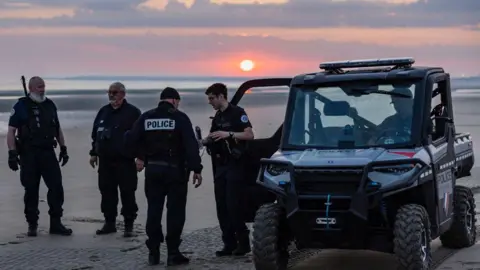
The result, she said, was a “phenomenal” profit margin for the gangs, who could make up to €60,000 ($65,000; £50,000) for each boat launched, with roughly half of those boats reaching UK waters, leading to an income for the gang of €3.5m ($3.8m; £2.9m) a year.
The gang itself was accused of controlling the lion’s share of all Channel crossings from the French coast – with its network delivering equipment from across Europe – until, in late 2021 and 2022, its members were arrested in France, the UK, the Netherlands, Belgium and Germany, as part of the largest international operation of its kind at the time against small-boat smugglers.
In all, 17 men and one woman are now on trial, 12 were found guilty earlier, and three more will be tried next year.
As Ms Carros set out the prosecution’s case against each of the accused, there were gasps of disappointment from at least two relatives seated in the courtroom, at the long sentences being demanded. The trial is expected to end in early November.
“We request a sentence of 15 years, a €200,000 fine and a permanent ban from French territory,” said Ms Carros in reference to Mirkhan Rasoul, who is accused of continuing to control the gang from a prison in central France.
“We found three mobile telephones in his cell,” she said, going on to describe an audio recording on which Mr Rasoul had boasted of the prison in Tours being “almost like a hotel… they searched the cell but never found my phones. The police are very kind”
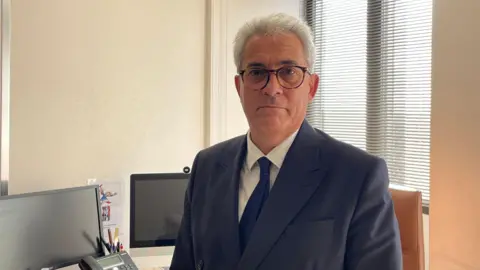
But will this huge trial, and the prospect of tough sentences, act as a serious deterrent for a smuggling industry that has, in terms of the sheer number of successful small boat crossings, continued to thrive in the years since these arrests?
The prosecutors directly involved in this trial were not willing to talk to the BBC, but Pascal Marconville, lead prosecutor at the regional Court of Appeal for northern France, suggested that the long sentences were part of a broader strategy to raise the cost of smuggling for the gangs and their customers.
“The action taken by French police, with the support of investigative judges, is designed not only to thwart their actions, but also to make such operations so expensive that they lose their appeal,” Mr Marconville told us.
He described how the gangs had evolved in recent years from informal groups supporting their own countrymen to “networks organised much like drug gangs”.
He went on to sketch out a fragmented network with different “sectors” focusing on separate parts of the smuggling industry.
“It’s like chess, and they have [the advantage] on the board. So they’re always one step ahead of us. We have to adapt and understand how we can counter these networks. We’ve struggled with the ringleaders because when they’re arrested and imprisoned they still manage to run their networks from inside,” he said.
Despite the difficulties for law enforcement officials working across different countries and, for instance, different laws related to bail and standards of evidence, Mr Marconville praised the collaboration between French and British officials, saying the UK was “very willing to come up with solutions to improve co-operation”.
The Germans, on the other hand “who we always think of as very efficient people, don’t make things easier [for us]”, he noted.
But one of the defence lawyers involved in this case played down its broader impact on the small boat crisis.
“The sentences are becoming much harsher now. That’s clear. And I think they will continue to toughen them. Unfortunately… I am pessimistic because I don’t think it will stop… because in these [smuggling] circles people think only about money,” said Kamal Abbas.
Mr Abbas, who is defending a man accused of acting as decoy driver for smugglers’ convoys, explained how three of the accused in this trial, who were released on bail last year after two years in detention, were arrested soon afterwards in Belgium on fresh smuggling charges.
“Nothing discourages them… they see imprisonment as just another bump on the road,” he said.
After more than a decade involved in smuggling trials, Mr Abbas had another concern about their impact.
“[The real leaders] always escape. If their leader is Iraqi, he’s in Iraq. If he’s Iranian, he’ll be in Iran. But the link is often in England, I’m sure of that. The British authorities should look harder at certain areas of London if they want to stop this phenomenon,” said Mr Abbas.
[BBC]
-

 Sports4 days ago
Sports4 days agoOshara making huge strides in cricket in UK
-
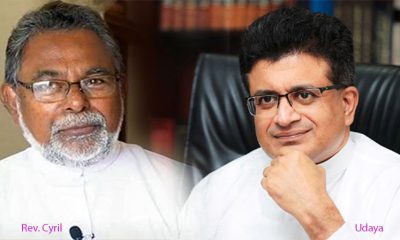
 News5 days ago
News5 days agoChurch not interested in reports sought by Gammanpila: Spokesperson
-

 Editorial6 days ago
Editorial6 days agoMuch-maligned Manape
-

 News5 days ago
News5 days agoJohnston missing amid probe into illegally assembled BMW
-
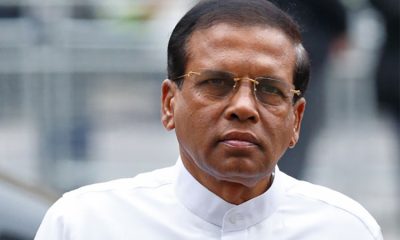
 News5 days ago
News5 days agoSirisena teases 2018 PM ouster secret, urges clean leadership
-
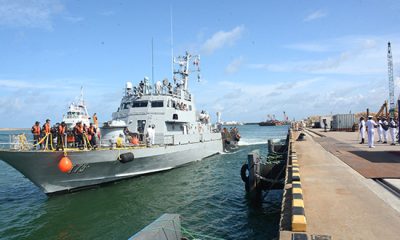
 Latest News3 days ago
Latest News3 days agoINS Kalpeni arrives in Colombo
-
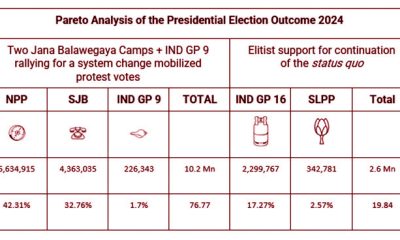
 Opinion2 days ago
Opinion2 days agoA Pareto analysis of ‘Jana Balawegaya’ force
-
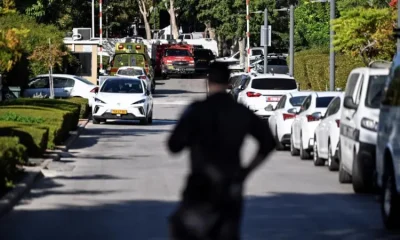
 Latest News3 days ago
Latest News3 days agoDrone ‘launched towards’ Israeli PM Netanyahu’s home









